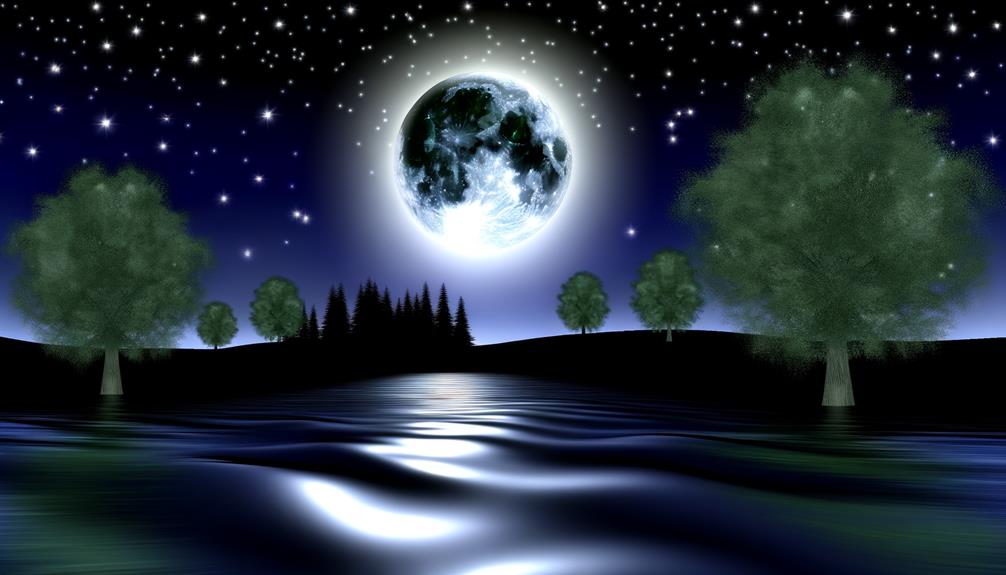Luna Name Meaning and Origin
Luna, originating from Latin for "moon," is imbued with rich historical and cultural significance. It traces back to Roman mythology where Luna was the goddess of the moon, embodying light and celestial power.
Historically, Luna was widely used among Roman women, symbolizing divine femininity and ritual importance. In modern times, the name has resurfaced, gaining popularity globally, particularly in English-speaking countries.
This resurgence reflects an appreciation for nature-inspired names, bolstered by Luna's presence in literature and popular media. The name's allure continues to grow, intertwined with mythological and astrological significance, and there is much more to explore.

Key Takeaways
- Luna originates from the Latin word for 'moon,' symbolizing light and brightness.
- The name is associated with the Roman goddess of the Moon, reflecting celestial and mythological significance.
- Luna's historical usage dates back to ancient Roman times, linked to religious and cultural practices.
- The name has regained popularity in the 21st century, influenced by literature, media, and nature-inspired trends.
- Luna's appeal is enhanced by its connection to celestial themes and its representation in popular culture.
Etymology of Luna
Derived from the Latin word for 'moon,' the name Luna has its roots firmly planted in ancient Roman mythology and language.
In classical Latin, 'lūna' directly refers to the moon, embodying both its celestial and mythological aspects. The term is etymologically linked to the Proto-Indo-European root *leuksna, meaning 'light' or 'brightness.' This root underscores the ancient perception of the moon as a luminous entity in the night sky.
Additionally, the name Luna is associated with the Roman goddess of the moon, who was believed to preside over the lunar cycles and influence terrestrial phenomena. The etymology of Luna intertwines linguistic evolution with cultural and mythological significance, illustrating the enduring legacy of ancient civilizations on modern nomenclature.
Historical Usage
The historical usage of the name Luna can be traced back to ancient Roman times, where it not only served as a common given name but also held significant religious and cultural connotations.
In Roman society, Luna was associated with the moon and was often invoked in contexts related to timekeeping, agriculture, and religious observances. The name was prevalent among Roman women, reflecting the societal reverence for lunar deities and celestial phenomena.
This usage persisted through the centuries, particularly in regions influenced by Roman culture. Over time, the name Luna maintained its popularity, adapting to various linguistic and cultural contexts while retaining its historical roots and significance.
This enduring legacy underscores its broad appeal and deep historical resonance.
Luna in Mythology
Building upon its historical significance, the name Luna also occupies a prominent place in mythology, particularly within the pantheon of Roman deities. Luna was revered as the divine embodiment of the Moon, a celestial figure of immense importance in Roman religious practices.
As a goddess, Luna was often depicted driving a chariot across the night sky, illuminating the darkness with her ethereal light. Her worship was closely associated with cycles of time, particularly the lunar phases, which were integral to agricultural and ritualistic calendars.
The Roman Luna is analogous to the Greek goddess Selene, both representing lunar deification. This mythological legacy underscores Luna's enduring cultural resonance and its profound connections to natural and cosmic phenomena.
Cultural Significance
The name Luna holds profound cultural significance, rooted in its mythological connections, artistic inspirations, and global traditions.
Mythologically, Luna is associated with the Roman goddess of the moon, embodying divine femininity and celestial power.
Artistically, Luna has inspired countless works, from Renaissance paintings to contemporary music, while globally, various cultures celebrate lunar festivals, underscoring the name's enduring universal appeal.
Mythological Connections
In various mythological traditions, Luna is revered as a potent symbol of the moon, embodying its mystique and influence across different cultures.
In Roman mythology, Luna is the divine personification of the Moon, often depicted riding a chariot across the night sky. Her Greek counterpart, Selene, similarly represents the moon's luminescence and cyclical nature.
The name Luna has also been linked to ancient lunar deities in other cultures, such as the Sumerian goddess Nanna and the Chinese moon goddess Chang'e. These mythological connections underscore Luna's timeless allure and its role in symbolizing femininity, intuition, and the passage of time.
This rich mythological heritage highlights the name's enduring resonance and universal appeal across diverse cultural landscapes.
Artistic Inspirations
Drawing from its mythological roots, the name Luna has inspired a plethora of artistic expressions, spanning literature, visual arts, music, and film, each medium capturing the moon's ethereal beauty and enigmatic presence. The cultural significance of Luna is profoundly evident in various artistic works, reflecting humanity's fascination with the celestial.
| Medium | Notable Work | Description |
|---|---|---|
| Literature | "Luna" by Julie Anne Peters | A novel exploring identity and transformation |
| Visual Arts | "Luna" by Artemisia Gentileschi | A painting depicting the moon goddess |
| Music | "Luna" by Smashing Pumpkins | A song symbolizing love and longing |
| Film | "Luna" directed by Dave McKean | A film intertwining fantasy and reality |
| Photography | "Luna" by Ansel Adams | A series capturing the moon's serene beauty |
This table encapsulates Luna's artistic inspirations.
Global Traditions
Across diverse cultures, the name Luna holds deep-rooted symbolic meanings and traditions that reflect humanity's universal reverence for the moon.
In Roman mythology, Luna was the divine embodiment of the moon, revered for her luminescence and cycles, symbolizing renewal and femininity. Similarly, in ancient Greek culture, Selene, the equivalent of Luna, was venerated for her beauty and celestial influence.
In East Asian traditions, the moon carries significant cultural weight, symbolizing harmony and enlightenment during festivals like the Mid-Autumn Festival. Indigenous cultures also revere the moon; for instance, many Native American tribes celebrate lunar phases in their rituals.
The name Luna, thus, encapsulates a rich tapestry of global traditions, embodying qualities of mystery, transformation, and cyclical continuity.
Popularity Trends
The name Luna has experienced significant shifts in popularity over the years, influenced by varying cultural and historical contexts.
Examining geographic popularity variations reveals distinct regional preferences and trends.
Additionally, the name's cultural impact, bolstered by literature and media, has further propelled its widespread adoption.
Historical Popularity Shifts
Examining the historical popularity shifts of the name 'Luna' reveals a fascinating journey marked by cultural influences, literary references, and evolving societal trends.
Originating from the Latin word for 'moon,' Luna experienced intermittent usage throughout history, often linked to mythological and celestial connotations. The name gained prominence during the late 19th and early 20th centuries, coinciding with a broader interest in classical themes.
Its popularity waned mid-century but resurged in the 21st century, bolstered by its frequent appearance in literature, media, and celebrity culture. Noteworthily, characters like Luna Lovegood from the 'Harry Potter' series have contributed to its contemporary appeal, reflecting an increased societal embrace of unique and ethereal names.
This cyclical pattern underscores Luna's enduring allure.
Geographic Popularity Variations
Analyzing the geographic popularity variations of the name 'Luna' reveals significant regional disparities, influenced by cultural norms, linguistic preferences, and local trends. This name enjoys widespread acceptance in several countries, yet its popularity is markedly higher in specific regions, demonstrating a multifaceted landscape of preferences.
- United States: 'Luna' has surged in popularity, ranking within the top 20 most chosen names for newborn girls.
- Spain: Reflecting its Latin roots, 'Luna' is a favored choice, often linked to the Spanish language and cultural heritage.
- Scandinavian Countries: Here, the name is gaining traction as a modern, yet nature-inspired option.
- Latin America: 'Luna' is commonly used, resonating with the region's linguistic affinities and cultural resonance.
Name's Cultural Impact
The name 'Luna' has experienced a significant resurgence in recent years, reflecting broader sociocultural trends and evolving perceptions of nature-inspired names. This renewed interest aligns with a growing cultural appreciation for celestial and natural elements, as evidenced by the popularity of other nature-based names.
Statistically, Luna has climbed the ranks in baby name charts globally, particularly in English-speaking countries. Its recent rise can be attributed to its frequent appearances in popular media, including literature, film, and television, which have collectively enhanced its appeal. Moreover, Luna's ethereal connotations resonate with contemporary parents seeking unique yet meaningful names for their children.
This trend underscores a larger movement towards embracing names that evoke a sense of wonder and connection to the natural world.
Famous Namesakes
Among the notable individuals bearing the name Luna, Luna Lovegood from J.K. Rowling's 'Harry Potter' series stands out as an iconic and beloved character. Her whimsical personality and unique perspective endear her to fans, highlighting the charm associated with the name.
Beyond fiction, several real-life figures have also brought prominence to the name Luna:
- Luna Blaise: An American actress known for her roles in television series like 'Fresh Off the Boat'.
- Luna Leopold: A distinguished hydrologist and geomorphologist whose work notably advanced environmental science.
- Luna Vachon: A professional wrestler renowned for her dynamic presence in the ring.
- Luna Bijl: A Dutch model celebrated for her contributions to high fashion and her appearances in major magazines.
Luna in Literature
Beyond the world of notable figures, the name Luna has also found a significant place within the pages of literature, where its ethereal quality often complements characters imbued with a sense of mystery and wonder.
In J.K. Rowling's 'Harry Potter' series, Luna Lovegood is portrayed as a whimsical and perceptive character, her name reflecting her otherworldly intuition and unique perspective.
Similarly, in Italo Calvino's 'Cosmicomics,' the narrative personifies the moon, imbuing it with a sense of enchantment and otherness.
Such literary representations underscore the name Luna's capacity to evoke celestial beauty and enigmatic charm, rendering it an ideal choice for authors seeking to imbue their characters with a touch of the mystical and the sublime.
Modern Appeal
In contemporary times, the name Luna has surged in popularity, resonating with modern parents who are drawn to its celestial connotations and poetic elegance. As a name that evokes the ethereal beauty of the moon, Luna has become a favorite choice in various cultural contexts.
Its modern appeal can be attributed to several factors:
- Cultural Representation: Luna appears frequently in popular media, from literature to television, enhancing its visibility and attractiveness.
- Etymological Charm: With roots in Latin, Luna embodies a timeless and classic allure.
- Astrological Significance: The moon's role in astrology adds a layer of mystique to the name.
- Global Recognition: Easily pronounced across different languages, Luna holds universal appeal, making it a versatile choice for diverse families.
Conclusion
The name Luna, with its rich etymological roots and historical significance, has traversed centuries, illuminating cultures and mythologies much like the celestial body it denotes. Its enduring appeal is evidenced not only in literary and mythological contexts but also in its modern resurgence.
With notable namesakes and a consistent presence in popular culture, Luna stands as a beacon of timeless elegance and universal charm, much like the moon itself casting a gentle glow across the ages.






